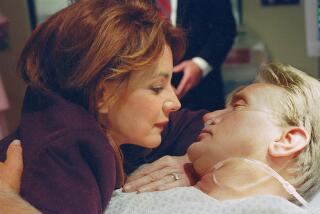Hinckley Relationship Scrutinized
- Share via
WASHINGTON — The calls come twice a day, mostly mundane exchanges between a man and a woman who met as patients in a psychiatric hospital more than two decades ago.
Their conversations rarely last more than a few minutes. But once a week the woman, who was released from the facility in 1990, drops off a bag of cat food for her onetime boyfriend to feed to the neighborhood cats he has taken on as his own.
Ordinarily these rituals would garner little attention from the outside world, except that the individuals are John W. Hinckley Jr., the man who shot President Reagan, and Leslie DeVeau, who was found not guilty by reason of insanity in the 1982 killing of her 10-year-old daughter.
Their relationship -- from the nature of their phone calls to what, if anything, comes along with the bag of cat food -- has been closely examined this week at a hearing in U.S. District Court over whether to grant Hinckley, 49, more unsupervised time with his family away from the hospital.
At the center of this debate is whether Hinckley’s request is as simple as it seems or whether it conceals unhealthy obsessions, like the one with actress Jodie Foster that led him to shoot Reagan in 1981.
In 1982, Hinckley was found not guilty by reason of insanity in the assassination attempt, which severely wounded Reagan, press secretary James Brady and two law-enforcement officers.
Since then, Hinckley has lived in a sort of legal no-man’s land, confined to St. Elizabeths Hospital even though his doctors say his mental illness has been in remission for about a decade.
In recent years, Hinckley has sought court approval for more freedom.
Over objections from the Reagan family, Judge Paul L. Friedman, who is hearing the current case, last year granted him eight unsupervised visits in the Washington area with his parents, including two overnight stays, although Hinckley was forbidden to see DeVeau during those trips.
Now he has asked the court for permission to stay with his parents for four days every two weeks in their home in Williamsburg, Va., about 150 miles south of Washington.
Because the parents are in their 70s, Hinckley’s sister, Diane, told the court that she would come from her home in Texas to help.
The request -- the first since Reagan’s death in June -- put Hinckley’s mental condition and personal life into the spotlight again.
Government prosecutors argue that the “unresolved nature” of Hinckley’s relationship with DeVeau should be of concern.
They fear that any thoughts of a renewed romance with DeVeau, 61, could pose a danger because of Hinckley’s history of unhealthy obsessions with women. They worry that he is unhealthily dependent on her. And they are concerned that the attention of the hearing may feed into Hinckley’s narcissism.
A hospital assessment of Hinckley’s mental state notes that he still grows defensive and guarded over issues important to him. He struggles with reintegrating into the community and with self-disclosure, according to his therapist and other experts.
But they also see Hinckley as a man whose illness long has been in remission. He does not pose a danger to himself or society, they say; he takes medication and is in regular therapy.
His recent outings with his parents -- sightseeing, eating meals and discussing his future -- have been successful, lifting Hinckley’s spirits, hospital records indicate.
And he is candid about his relationship with DeVeau, his therapist says. Though the two once were romantically involved, DeVeau has said that she became uncomfortable with the government scrutiny that accompanied the relationship, and withdrew from it several years ago.
Initially upset, Hinckley has come to accept the change, and her continued involvement in his life serves as a sort of therapy, said psychologist Sidney Binks, who has been Hinckley’s therapist for the past 5 1/2 years.
Hinckley and DeVeau have made a pact that they will tell the other if they ever notice any signs of mental illness, Binks told the court in testimony Friday. Their new platonic relationship has been steady, he said, and includes many mutual interests.
For instance, they share a love of cats, and both read the magazine Cat Fancy. They offer each other comfort, Binks said, such as when Hinckley was disturbed after one of the cats he cared for was run over.
Binks said Hinckley mentioned DeVeau on four of the eight recent visits with his parents.
“She has provided for him a window into the outside world, and it’s an important link for him,” Binks said, citing her weekly delivery of items to Hinckley.
Those exchanges have come under close scrutiny. On Friday, the prosecution raised questions over a delivery from DeVeau in June. Along with facial tissues, slacks and a bag was the Washington Post from the day after Reagan’s state funeral, according to a note in the nurses’ log.
Binks said he had been unaware of DeVeau’s action, but he added that the fact that she had sent the newspaper did not appear to shed any new light on Hinckley’s feelings toward the former president.
Hinckley has expressed sympathy for the victims of those he shot, Binks said, as well as for the struggles the Reagan family must have gone through with the former president’s deterioration from Alzheimer’s disease.
Paul Montalbano, who works at the hospital, echoed Binks’ testimony, saying Hinckley was particularly touched to learn from a newspaper account that Reagan had wanted to forgive him.
Closing arguments in the hearing are scheduled for Monday.
More to Read
Sign up for Essential California
The most important California stories and recommendations in your inbox every morning.
You may occasionally receive promotional content from the Los Angeles Times.













